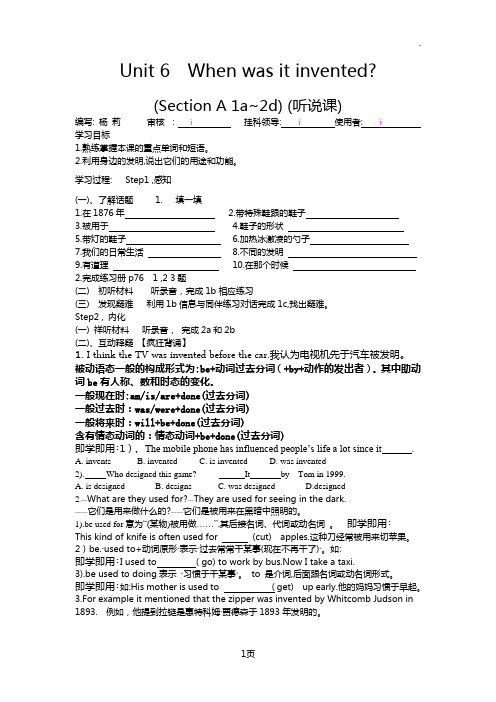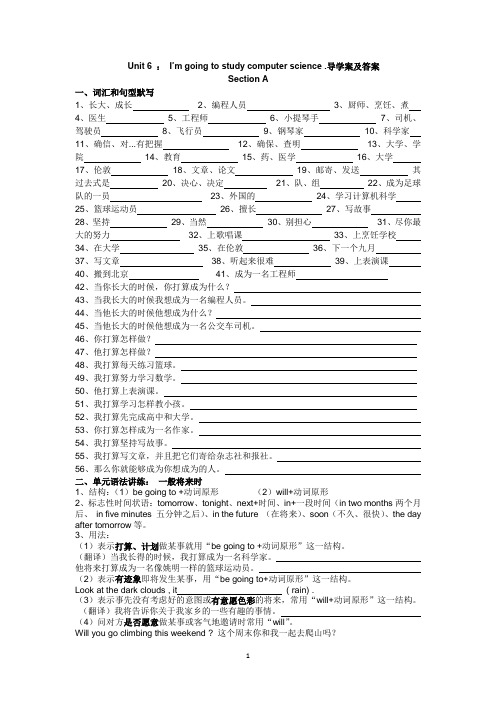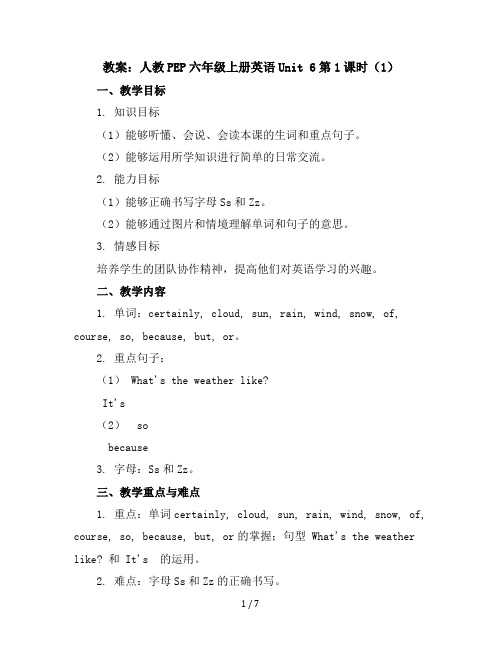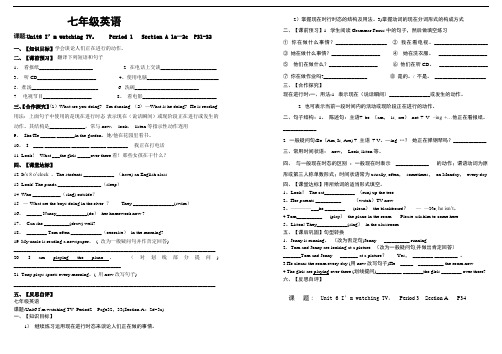Unit6导学案
《Unit6_When_was_it_invented?》导学案

Unit 6 When was it invented?(Section A 1a~2d) (听说课)编写: 杨莉审核:i 挂科领导: i 使用者: i学习目标1.熟练掌握本课的重点单词和短语。
2.利用身边的发明,说出它们的用途和功能。
学习过程: Step1 ,感知(一)、了解话题 1. 填一填1.在1876年2.带特殊鞋跟的鞋子3.被用于4.鞋子的形状5.带灯的鞋子6.加热冰激凌的勺子7.我们的日常生活8.不同的发明9.有道理10.在那个时候2.完成练习册p76 1 ,2 3题(二) 初听材料听录音,完成1b相应练习(三) 发现疑难利用1b信息与同伴练习对话完成1c,找出疑难。
Step2 , 内化(一) 祥听材料听录音,完成2a和2b(二)、互动释疑【疯狂背诵】1. I think the TV was invented before the car.我认为电视机先于汽车被发明。
被动语态一般的构成形式为:be+动词过去分词(+by+动作的发出者)。
其中助动词be有人称、数和时态的变化。
一般现在时:am/is/are+done(过去分词)一般过去时:was/were+done(过去分词)一般将来时:will+be+done(过去分词)含有情态动词的:情态动词+be+done(过去分词)即学即用:1),The mobile phone has influenced people’s life a lot since it.A. inventsB. inventedC. is inventedD. was invented2). Who designed this game? It by Tom in 1999.A. is designedB. designsC. was designedD.designed2.—What are they used for?—They are used for seeing in the dark.——它们是用来做什么的?——它们是被用来在黑暗中照明的。
人教版八年级上册Unit 6 导学案及答案

Unit 6 :I’m going to study computer science .导学案及答案Section A一、词汇和句型默写1、长大、成长2、编程人员3、厨师、烹饪、煮4、医生5、工程师6、小提琴手7、司机、驾驶员8、飞行员9、钢琴家10、科学家11、确信、对...有把握12、确保、查明13、大学、学院14、教育15、药、医学16、大学17、伦敦18、文章、论文19、邮寄、发送其过去式是20、决心、决定21、队、组22、成为足球队的一员23、外国的24、学习计算机科学25、篮球运动员26、擅长27、写故事28、坚持29、当然30、别担心31、尽你最大的努力32、上歌唱课33、上烹饪学校34、在大学35、在伦敦36、下一个九月37、写文章38、听起来很难39、上表演课40、搬到北京41、成为一名工程师42、当你长大的时候,你打算成为什么?43、当我长大的时候我想成为一名编程人员。
44、当他长大的时候他想成为什么?45、当他长大的时候他想成为一名公交车司机。
46、你打算怎样做?47、他打算怎样做?48、我打算每天练习篮球。
49、我打算努力学习数学。
50、他打算上表演课。
51、我打算学习怎样教小孩。
52、我打算先完成高中和大学。
53、你打算怎样成为一名作家。
54、我打算坚持写故事。
55、我打算写文章,并且把它们寄给杂志社和报社。
56、那么你就能够成为你想成为的人。
二、单元语法讲练:一般将来时1、结构:(1)be going to +动词原形(2)will+动词原形2、标志性时间状语:tomorrow、tonight、next+时间、in+一段时间(in two months两个月后、in five minutes 五分钟之后)、in the future (在将来)、soon(不久、很快)、the day after tomorrow等。
3、用法:(1)表示打算、计划做某事就用“be going to +动词原形”这一结构。
六年级上册英语导学案-Unit6第1课时(1)-人教PEP

教案:人教PEP六年级上册英语Unit 6第1课时(1)一、教学目标1. 知识目标(1)能够听懂、会说、会读本课的生词和重点句子。
(2)能够运用所学知识进行简单的日常交流。
2. 能力目标(1)能够正确书写字母Ss和Zz。
(2)能够通过图片和情境理解单词和句子的意思。
3. 情感目标培养学生的团队协作精神,提高他们对英语学习的兴趣。
二、教学内容1. 单词:certainly, cloud, sun, rain, wind, snow, of, course, so, because, but, or。
2. 重点句子:(1) What's the weather like?It's(2) sobecause3. 字母:Ss和Zz。
三、教学重点与难点1. 重点:单词certainly, cloud, sun, rain, wind, snow, of, course, so, because, but, or的掌握;句型 What's the weather like? 和 It's 的运用。
2. 难点:字母Ss和Zz的正确书写。
四、教具与学具准备1. 教具:PPT、黑板、粉笔。
2. 学具:课本、练习册、铅笔、橡皮。
五、教学过程1. 导入(1)复习上一单元的单词和句子。
(2)引导学生谈论天气,引出本课内容。
2. 新课呈现(1)展示PPT,呈现本课的生词和句子。
(2)讲解生词和句子的意思,让学生跟读。
3. 课堂练习(1)让学生分组,进行角色扮演,运用本课的单词和句子进行对话。
(2)挑选几组学生进行表演,给予评价。
4. 书写练习(1)讲解字母Ss和Zz的书写方法。
(2)让学生在练习册上书写字母Ss和Zz,教师巡视指导。
5. 课堂小结六、板书设计1. 生词:certainly, cloud, sun, rain, wind, snow, of, course, so, because, but, or。
Unit6Keepourcityclean(导学案)译林版英语六年级上册(1)

Unit 6 Keep our city clean第一学时【学习目标】1.能够四会掌握单词keep, clean, make, dirty并熟练地听说读air, smoke, rubbish, messy, dead, move… away from, bin, plant, more2.能正确地说出保护环境的措施,保护环境从身边做起。
【学习重点难点】1.fun time, grammar time2.Story time,能正确地进行ask and answer部分的问答。
【学习过程】自主学习英汉互译1.我们的城市2.使得我们的城市肮脏3.在水里4.种更多的树合作交流1) What 作为疑问词看作是单数,所以动词make使用了第三人称单数形式。
2) Smoke 和rubbish都是不可数名词。
一般现在时的肯定句中,主语是不可数名词,谓语动词也用第三人称单数形式。
3) Make和keep的不同用法:Make 的意思有很多,做,制作,制造,整理,获得等,在本单元中的意思是“使……变得”,make+sth/ sb.+形容词。
如:Smoke from cars makes the air dirty. 汽车排出来的烟使空气变得肮脏。
Rubbish makes the streets messy and dirty. 垃圾使街道杂乱无章。
Keep的意思是保持,经营,饲养,遵守等,本单元中的意思是“保持”。
例如:We can put rubbish in the bin to keep our city clean. 我们把垃圾放进垃圾桶能让我们的城市保持干净。
Do you want some…是征求对方意见或者建议的句型。
句中通常用some,而不是用any. 其同义句为Would you like some…可以用Yes, please. 或No,t hanks.来回答。
检测反馈一、英汉互译1.在垃圾箱里2.一些工厂3.小心地滑4.these pictures5.take the bus and the metro6.keep our city clean7.move…away from8.walk to school9.make the street messy10.a juice shop二、连词成句1.cars the smoke dirty air from makes.2.the clean is street?3.put the in we bin can rubbish the.4.can city what to our clean do we keep?5.walk can school we to.。
Unit 6 导学案人教版九年级上册英语 Unit 6 导学案 Unit 6 导学案

Unit 6 I like music that I can dance to.Section A(1)【学习目标】1. To learn to understand and use relative clauses with that2. To listen and speak about music that you like【重点难点】重点:1. To learn to understand and use relative clauses with that难点:2. prefer v. 更喜爱,更喜欢remind sb. of sb. / sth. 提醒,使……记起…【预习案】1. Read and recite the wards from page 44 to 45 of the vocabulary.2. look at these sentences and try to understand them.I like music that I can dance to. 我喜欢可以边听边舞的音乐。
主语+谓语+宾语+定语从句(关系代词that指代先行词music引导定语从句,同时作定语从句谓语dance to的逻辑宾语。
)I like lessons that I can learn by myself. 我喜欢可以自学的功课。
I like jobs that I am interested in. 我喜欢我感兴趣的工作。
I like dogs that I can keep out. 我喜欢可以拒之门外的狗狗。
I like cats that I can stay away from. 我喜欢可以泰然处之的猫眯。
I like money that I can pick up. 我喜欢可以拣到的钱。
【探究案】1. prefer v. 更喜爱,更喜欢choose sth. rather than sth. else; like sth. better1) prefer + n. eg.I prefer groups that play quiet and gentle songs. 我更喜欢演唱轻柔音乐的组合。
新版unit6-I'm-watching-TV-导学案

七年级英语课题:Unit6 I’m watching TV。
Period 1 Section A 1a—2c P31-32一、【知识目标】学会谈论人们正在进行的动作。
二、【课前预习】翻译下列短语和句子1。
看报纸_____________________ 2. 在电话上交谈______________________ 3。
听CD_______________________ 4。
使用电脑____________________________ 5.煮汤__________________________ 6. 洗碗_________________________7. 电视节目___________________ 8。
看电影_____________________________三、【合作探究】(1)-What are you doing? - I'm dancing.(2)—What is he doing? -He is reading. 用法:上面句子中使用的是现在进行时态.表示现在(说话瞬间)或现阶段正在进行或发生的动作。
其结构是______________,常与now,look,listen等指示性动作连用.9。
She/He ______ _______in the garden。
她/他在花园里看书。
10。
I ____ __________ _______ ______ ________. 我正在打电话.11. Look!What ___the girls _____over there.看!那些女孩在干什么?四、【课堂达标】12. It’s 8 o’clock 。
The students ____________ (have) an English class.13. Look! The panda _________________(sleep).14. Who ___________(sing) outside?15. -—-What are the boys doing in the river ?---They ________________(swim)16。
Unit 6 How many?Part C Lesson 1(导学案)-2022-2023学年英语

Unit 6 How many?Part C Lesson 1(导学案)一、课前预习在上一课中,我们学习了一些数字词汇,如one, two, three等。
这些数字词汇可以帮助我们数数并进行简单的数学计算。
在本课中,我们将进一步探讨如何使用这些数字词汇描述不同的物品数量。
请思考以下问题:1.How many fingers do you have?(你有几个手指?)2.How many toes do you have?(你有几只脚趾?)3.How many eyes do you have?(你有几只眼睛?)4.How many ears do you have?(你有几只耳朵?)5.How many noses do you have?(你有几个鼻子?)二、课堂探究1. 数量的表达方式在英语中,表示数量的方式有很多种。
以下是常见的几种表达方式:•数字词汇,如one, two, three等。
•分数,如half, a quarter, three quarters等。
•百分数,如50%, 75%等。
•小数,如0.5, 1.25等。
•十进制,如1.5, 2.25等。
2. 数量的比较当我们要比较不同物品的数量时,可以使用以下表达方式:•…和…一样多。
(… is/are as many as …)•…比…多。
(… is/are more than …)•…比…少。
(… is/are less than …)•…是…的两倍/三倍等。
(… is twice/three times as many as …)请思考以下问题:1.3比2多多少?2.5是2的几倍?3.4和6一样多吗?4.1.5是1的几倍?3. 数量的表示当我们要描述一些物品的数量时,可以使用以下表达方式:•There is/are …(这里有…)•We have got …(我们有…)•I’ve got …(我有…)请从以下几个问题中选择合适的表达方式:1.课桌上有几本书?2.你们班有多少学生?3.你有几张卡片?4.电视柜里有多少DVD光盘?三、课后拓展1.数数游戏:请在家里或课堂上找出一些物品,让孩子进行数数练习。
六年级上册英语导学案-Unit 6 There are four seasons in a year

六年级上册英语导学案-Unit 6 There are four seasons in a year. Lesson 36|人教(精通)一、教学目标1.能听、说、读、写单词spring, summer, autumn, winter以及句子There are four seasons in a year 。
2.能运用所学知识描述自己喜欢的季节。
3.能阅读短文,理解文章大意,掌握文章中的关键信息。
4.通过学习兴趣爱好,培养学生的文化素养。
二、教学重点和难点1.教学重点:能听、说、读、写单词spring, summer, autumn, winter以及句子There are four seasons in a year。
2.教学难点:能阅读短文,理解文章大意,掌握文章中的关键信息。
三、教学过程1. 导入新课今天我们学习关于季节的话题。
请大家分享一下你们最喜欢的季节是什么,为什么?2. 学生展示请几位同学分享一下自己最喜欢的季节以及原因。
3. 呈现单词在黑板上呈现spring, summer, autumn, winter这四个单词。
请学生跟随老师朗读。
4. 发音练习老师说出单词,学生跟读并模仿老师正确的发音。
5. 学习句型呈现句子There are four seasons in a year。
请学生跟随老师朗读。
6. 模仿句型老师带领学生模仿句子并用不同的答案来回答老师所提出的问题。
例如:Q: How many seasons are there in a year?A: There are four seasons in a year.Q: What are the four seasons?A: The four seasons are spring, summer, autumn and winter.7. 阅读理解请学生阅读文章,并在课本上找出正确的答案。
Winter is a very cold season. It starts in December and ends in February. It often snows in winter. People can go skiing in the snow. Children can make a snowman and have snowball fights. Winter clothes are very warm. We wear a coat, a hat, gloves and boots. It’s important to keep warm in winter.1.What season is it in December, January and February?A. SpringB. SummerC. AutumnD. Winter2.What can people do in the snow?A. They can go swimming.B. They can go hiking.C. They can go skiing.D. They can go sunbathing.3.What kind of clothes do people wear in winter?A. Thin clothes.B. Small clothes.C. Warm clothes.D. Cool clothes.8. 指导学生写作请学生根据自己最喜欢的季节,写一篇50个字的短文。
- 1、下载文档前请自行甄别文档内容的完整性,平台不提供额外的编辑、内容补充、找答案等附加服务。
- 2、"仅部分预览"的文档,不可在线预览部分如存在完整性等问题,可反馈申请退款(可完整预览的文档不适用该条件!)。
- 3、如文档侵犯您的权益,请联系客服反馈,我们会尽快为您处理(人工客服工作时间:9:00-18:30)。
Unit6复习导学案—By CYFTask1:词形转化及相关的短语strawberry(复数形式)________________ family(复数形式)__________________ box(复数形式)_____________ bus(复数形式)___________ tomato(复数形式)______________ photo(复数形式)_____________watch(复数形式)_________________冰淇淋________________ 大量;许多_____________ 健康食品______________________食物单_______________ running star______________ French fries _______________ lots of=___________Task2 重点句型Do you like bananas?Yes, I do. / No, I don’t.Do they like French fries?Yes, they do. / No, they don’t.Does he like pears?Yes, he does. /No, he doesn’t.I like bananas. I don’t like bananas.They like broccoli. They don’t like broccoli.She likes ice cream. She doesn’t like ice cream.Task3 情景对话(听力练习、口语练习)A: Do you like carrots?B: Yes, I do. I like all vegetables.A: How about broccoli? Do you like broccoli?B: Yes, I do. It’s great! Do you like vegetables?A: No, I don’t like vegetables. Well, only salad. I like salad. But I like fruit. I like bananas, oranges…B: How about apples? I don’t like apples!A: Yes, I like apples. And you know what I really like?B: Ice cream!Task4 重点语法1.like 作及物动词,意为“喜欢”:(1)like sb. / sth.. 表示“喜欢某人/某物”:eg: I like fish.(2) like doing sth. 表示“喜欢做某事”,着重于习惯、爱好。
I like playing the piano.2. 辨析lots of , a lot of, many和much均意为“许多;大量”lots of / a lot of +可数名词复数/不可数名词many+可数名词复数much+不可数名词eg: There are _________________flowers in the garden.There is ___________________ milk in the bottle.3.可数名词单数变复数的规则:(1)一般在词尾加“-s”。
eg: apple—apples banana—bananas(2) 以s, x, ch, sh结尾的名词,在词尾加-es 。
eg: box —boxes bus —buses watch —watches(3)以辅音字母加“-y”结尾的名词,先把“y”变为“i”再加“-es”。
eg: family—families city —cities(4)可数名词复数形式是不规则变化的,需特殊记忆。
eg: man —men woman —women child—children sheep—sheep(5)以f 或fe结尾的名词变复数时要将f 或fe去掉, 再加-ves 。
eg: wife—wives knife—knives(6)以字母o 结尾的名词。
记住“两菜”“一人”加“-es”, 即tomato—tomatoesPotato—potatoes hero—heroes , 其余通常加“-s”。
4.Do you like…? 是一般现在时的一般疑问句,用来询问对方是否喜欢某物。
like 为实义动词,在句式变换时,要用助动词do 或does。
(1)肯定句式:主语+like/likes+…表示“某人喜欢……”。
(2)否定句式:主语+don’t/doesn’t like+…表示“某人不喜欢……”。
(3)一般疑问句及回答:Do/Does+主语+like+…?肯定回答:Yes,主语+ do/does. 否定回答:No,主语+don’t/dones’t.Task5:练习题:Ⅰ.用所给次的适当形式填空。
1.Liu Xiang is a great____________ (run).2.She likes __________ (egg) for breakfast.3.Linda____________ (have) chicken for lunch.4.Do you want to be a _____________ (run) star?5.My parents eat___________ (health) food.II. 单项选择:( ) 1. He is thirsty. Please give him some _________ to drink.A. riceB. meatC. waterD. oranges ( ) 2. There __________ some milk in the glass.A. areB. isC. hasD. have( ) 3. We would like some meat and rice ___________ lunch.A. toB. inC. ofD. for( ) 4. Everyone needs lots of ___________ every day.A. milksB. vegetableC. healthy foodD. apple( ) 5. I’d like to go shopping with you , __________ I’m too busy today.A. butB. andC. soD. or( ) 6. —_____________ is your brother?—He’s twelve.A. HowB. WhoC. WhichD. How old( ) 7. __________Betty _____________ bananas?A. Does; likesB. Do; likeC. Does; likeD. Do; likes( ) 8. I can see three _____________ in the two ____________ .A. tomato; photoB. tomatos; photosC. tomatoes; photosD. tomato; photos( ) 9. —_________your mother like ice cream?—Sorry, I __________ know.A. Does; don’tB. Do, don’tC. Does; doesn’tD. Does; am not( ) 10. My grandmother likes ____________ and ____________ for lunch。
A. hamburgers; broccolisB. hamburgers; broccoliC. hamburger; broccoliD. hamburgers; broccolis( ) 11. I _________ three eggs and some milk for breakfast.A. haveB. eatesC. hasD. eats( ) 12. —Do you know Wang Junxia?—Yes, she is a ___________ star.A. runnerB. tomatoC. runD. running( ) 13. My favorite fruit is ____________.A. saladB. tomatoC. broccoliD. apples( ) 14. —___________ they like carrots?—No, they _________ .A. Are; aren’tB. Do, aren’tC. Do; don’tD. Are; don’t( ) 15. —__________ does he like to eat?—Bananas.A. WhatB. WhereC. What’sD. Where areIII.完形填空My name is Wang Jing. I’m a Chinese girl. I study at No. 3 Middle School of Dongtai. From Monday to Friday I 1 up at six in the morning. I read English 2 six twenty. I often 3 breakfast at six fifty. After breakfast I 4 to 5 at seven ten. We have four classes in the morning. At twelve ten I have 6 with my mum and dad. In the afternoon we have two classes. We go home at five. 7 is at six twenty. I 8 my homework at about seven. After that I watch TV. Then I 9 to 10 at about nine thirty.()1. A. gets B. get C. to get D. getting()2. A. in B. at C. on D. with()3. A. have B. haves C. has D. having()4. A. drive B. come C. go D. walk()5. A. home B. school C. the school D. the home()6. A. breakfast B. lunch C. supper D. dinner()7. A. Breakfast B. Lunch C. Supper D. Bread()8. A. write B. writes C. do D. does()9. A. come B. comes C. goes D. go()10. A. bed B. the bed C. a bed D. an bedIV.阅读理解。
